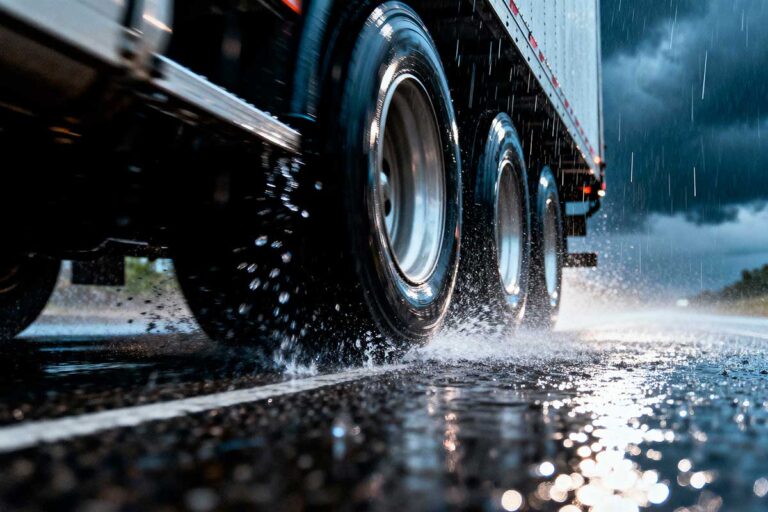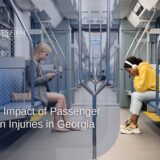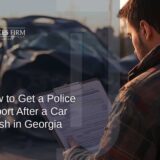The Dangers of Jackknife Truck Accidents in Georgia — Why They Happen and Who’s Liable
Large commercial trucks are a staple on Georgia’s highways, transporting goods essential to our economy. However, when these massive vehicles lose control, the consequences can be catastrophic. Commercial‐truck crashes are already among the most severe and complex types of motor vehicle accidents. One particularly dangerous type of crash unique to tractor-trailers is jackknife truck accidents. When a large tractor‑trailer “jackknifes,” the risks, injuries and damage multiply quickly.
At The Jewkes Firm, we understand the serious risks these collisions pose to victims and their families. This article explains what jackknife truck accidents are, why they happen frequently in Georgia, and who can be held liable when tragedy strikes. If you or someone you care about has been in a jackknife crash in Georgia, it’s vital to understand both why these accidents happen and how liability may be assigned.
What is a Jackknife Truck Accident?
A jackknife crash occurs when the cab (tractor) and trailer of a large truck fold toward each other—forming an angle resembling a partially closed pocketknife—hence the name “jackknife.” The trailer swings out sideways behind the tractor and often blocks traffic, strikes other vehicles, or causes the rig to spin or roll. This typically happens if the truck’s wheels lock up during heavy braking, causing the trailer to swing around towards the cab. The trailer might then cross multiple lanes of traffic or even overturn, creating hazardous conditions for other motorists.
On Georgia’s highways—such as interstates I-285, I‑75, I-85, and I‑20—jackknife accidents pose distinct dangers:
- The size and weight of the rig mean the trailer can cross lanes, strike multiple vehicles, or block entire roadways.
- Once the trailer swings out of control, the driver often cannot regain control in time.
- With high speeds, large masses and unpredictable motion, injuries tend to be catastrophic.
Injured in a Jackknife Truck Accident? Contact Us For A Free Consultation
Injured in a Jackknife Truck Accident?

Why Do Jackknife Accidents Happen in Georgia?
Several factors (often combined) make jackknife crashes a serious risk on Georgia roads:
Driver Error and Unsafe Driving Practices
- Sudden or harsh braking. Commercial trucks require longer distances to stop than passenger vehicles. If a truck driver brakes too suddenly or forcefully—especially on a downhill grade—it increases the chance the wheels will lock and the trailer will swing out.
- Speeding and driver error. Over-speeding or distracted driving reduces a truck driver’s ability to maintain control. Sharp turns taken at high speed or inattentiveness can trigger a jackknife scenario.
- Fatigue, distraction or impairment. A tired or distracted driver may misjudge conditions, delay braking, or fail to respond appropriately, increasing the risk of jackknifing.
Mechanical Failures and Poor Maintenance
If the trailer wheels lock or the braking system is not well maintained, the trailer may swing.
Any mechanical weakness in the tractor‑trailer system, such as worn tires, suspension issues, or defective components, raises risk.
Improper Loading or Cargo Shifts
If the trailer’s weight shifts or is off‑balance, it’s far more likely to jackknife. Common causes include unbalanced loads, unsecured cargo, and overweight trailers.
When the trailer contents move (shifting cargo), due to a sudden stop or turn, that triggers instability, especially under heavy braking.
Road and Weather Conditions
Georgia experiences heavy rain, fog, and icy patches during winter months. Slippery road surfaces reduce tire traction and increase stopping distances, making it easier for a truck to lose control and jackknife.
Heavy Traffic and Road Design
Busy Georgia highways and complex interchanges sometimes require quick maneuvering, leaving little margin for error for large trucks.
Corporate Pressures and Training Gaps
Shipping deadlines, unrealistic schedules, and insufficient driver training contribute indirectly by increasing fatigue or encouraging unsafe driving practices.
The Devastating Dangers of Jackknife Truck Accidents — Severe Injuries and Big Claims
Jackknife accidents are more dangerous than regular car crashes for several reasons:
- Widespread Blockages and Secondary Collisions. A jackknifed trailer can block multiple lanes or strike vehicles simultaneously, creating multi‑vehicle pile-ups.
- High‑Energy Impact. Trucks are massive; when a driver loses control, the force is huge. The sudden folding motion can cause violent crashes involving multiple vehicles.
- Severe Injuries and Fatalities. Victims often sustain severe trauma and suffer catastrophic injuries—broken bones, spinal cord injuries, head trauma, amputations, and internal injuries.
- Hazardous Cargo Spills. Many trucks carry toxic or flammable materials, posing additional risks.
Complex liability means more parties and more insurance coverage—both opportunities and challenges. Injuries may require lifetime care. Families often bear an enormous financial burden due to the long-term costs.

Who Is Liable in a Jackknife Truck Accident in Georgia?
Determining responsibility in jackknife truck accidents can be intricate. Georgia law allows injured parties to pursue claims against any negligent entity whose faults contributed to the crash. Multiple parties may share responsibility:
Truck Driver
If driver negligence, such as speeding, distracted driving, fatigue, or failure to properly operate the vehicle, caused the jackknife, the driver is liable.
Trucking Company or Carrier
Employers may be responsible under the legal doctrine of “respondeat superior” for negligent hiring, training, or supervision of the driver. They can also be liable if the company disregarded safety regulations or encouraged unsafe driving practices.
Truck Manufacturer, Maintenance Contractor or Parts Manufacturer
Mechanical defects or design flaws in the braking system or trailer can cause accidents. In such cases, manufacturers or parts suppliers may be liable.
Government or Road Authority
If the road design, signage, pavement conditions or maintenance of infrastructure contributed (e.g., slippery pavement, lack of proper warnings/markings), a governmental entity may share liability under certain circumstances.
Cargo Loader or Shipper
If improper loading or failure to secure cargo caused trailer instability, the loading company may be responsible.
Other Drivers
Sometimes, the negligent actions of another motorist—such as cutting off the truck or sudden stops—trigger a jackknife accident.
The Legal Framework in Georgia — What Claimants Should Know
A jackknife truck accident in Georgia is a high‑risk event with the potential for devastating injuries and complicated legal issues. Understanding why these crashes happen and who may be liable is a critical step toward achieving justice and ensuring full compensation.
- Georgia uses a fault‑based liability standard. The negligent party must have failed to exercise reasonable care and that failure must have caused the crash.
- Under Georgia’s modified comparative negligence rule, you can still recover damages if you are partly at fault—so long as your share of fault is less than 50%. Your share of the blame lowers the amount of money you can recover.
- Statute of limitations. In Georgia, you must file a personal injury lawsuit within two years of the crash date.
- Regulatory overlay. Trucking crashes trigger additional federal regulations (for example, hours‑of‑service rules, maintenance logs, driver logs) and carriers often have heightened duties. These regulations add complexity and additional layers of liability.
Steps to Take If You Are Involved in a Jackknife Truck Accident
- Seek immediate medical attention — Even if you feel “okay” initially, injuries may appear later.
- Preserve evidence — If safe to do so: take photographs of the scene, truck, skid marks, trailer position. Get contact info for witnesses.
- Do not give a recorded statement to the trucking company’s insurer without talking to an attorney — Trucking companies and insurers will begin investigations immediately and may attempt to shift blame.
- Document your losses — Keep records of medical bills, therapy, lost wages, repair bills, out‑of‑pocket costs.
- Contact an experienced truck‑accident attorney promptly — Large truck accident claims are time‑sensitive. Companies may lose or destroy logs, black‑box data, maintenance records so acting quickly matters.

GEORGIA PERSONAL INJURY LAWYER NEAR ME
Why Choose The Jewkes Firm and Attorney Jordan Jewkes?
At The Jewkes Firm, we understand the complex nature of commercial truck accident litigation in Georgia. When you’re facing the aftermath of a jackknife accident—with physical pain, emotional trauma, lost income and uncertainty about the future—you need an advocate who knows:
- How to investigate truck driver logs, black box data and maintenance records.
- How to identify all potentially liable parties (driver, carrier, shipper, maintenance provider, manufacturer).
- How to negotiate with large trucking‑company insurers and if necessary take the case to trial.
- That while your world has been turned upside down, your legal rights still matter—and time is of the essence.
We provide personalized attention, thorough investigation, and unwavering representation so you can focus on healing while we handle the legal details.
Contact The Jewkes Firm Today
Jackknife truck accidents are a serious danger on Georgia roads, but you don’t have to face the aftermath alone. Attorney Jordan Jewkes brings a wealth of experience managing cases related to commercial truck accidents. Our team secures maximum compensation for medical bills, lost income, pain and suffering, and related damages. If you were hurt in a collision involving a commercial truck, contact The Jewkes Law Firm at (770) 771-5130 for a free consultation. We protect your rights and guide you every step of the way.
Frequently Asked Questions
What is a jackknife truck accident?
A jackknife truck accident occurs when the truck’s cab and trailer swing toward each other, creating a dangerous angle that can block lanes, hit other vehicles, and cause significant damage. These accidents often happen due to sudden braking, speeding, or poor road conditions.
What causes jackknife truck accidents in Georgia?
Jackknife accidents often happen due to harsh braking, slippery road conditions, driver error, improperly loaded trailers, or mechanical failures that cause the trailer to swing and fold toward the tractor.
Who is liable for a jackknife truck accident in Georgia?
Liability can lie with the truck driver, trucking company, manufacturer of truck parts, cargo loaders, or even other drivers depending on the cause.
Can I get compensation for my injuries from a jackknife truck accident in Georgia?
Yes, you may recover compensation for medical bills, lost wages, pain and suffering, and other damages caused by the accident. Working with an experienced truck accident lawyer is crucial to ensure that you receive the full compensation you deserve.
How long do I have to file a lawsuit for a jackknife truck accident in Georgia?
In Georgia, you generally have two years from the date of the accident to file a personal injury lawsuit. However, it's essential to reach out to an attorney promptly to ensure that critical deadlines are met and your evidence is safeguarded.
How dangerous are jackknife truck accidents?
They are very dangerous. Jackknife accidents can block multiple lanes causing pile-ups, lead to severe injuries or fatalities, and sometimes involve hazardous cargo spills.
What steps should I take if I I'm involved in a jackknife truck accident?
First, seek medical attention immediately. Then contact an experienced personal injury attorney like Attorney Jordan Jewkes to protect your rights and help pursue compensation.
Does Georgia law provide special rules for truck accident claims?
Yes, truck accident claims can involve federal and state safety regulations that add complexity to your case, making it important to have an attorney knowledgeable in commercial trucking laws.





